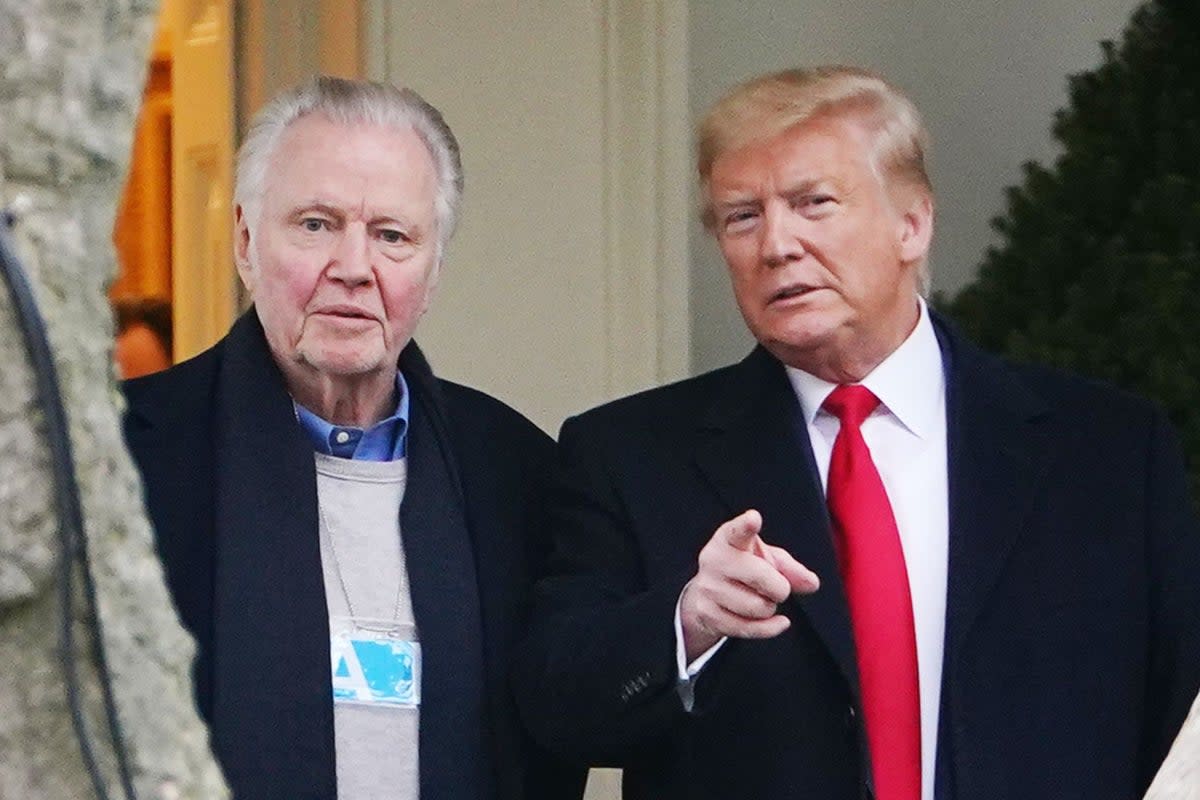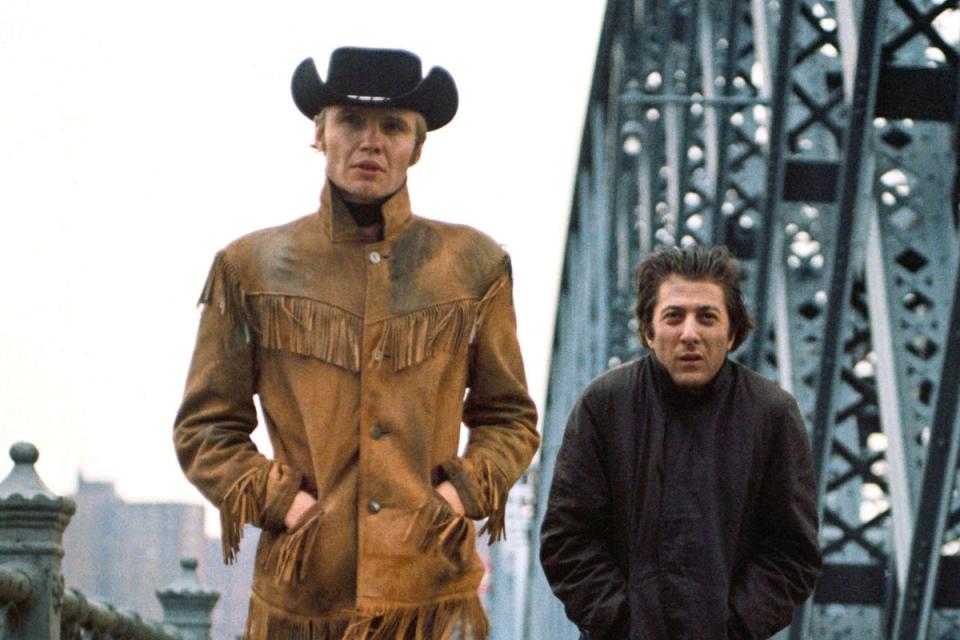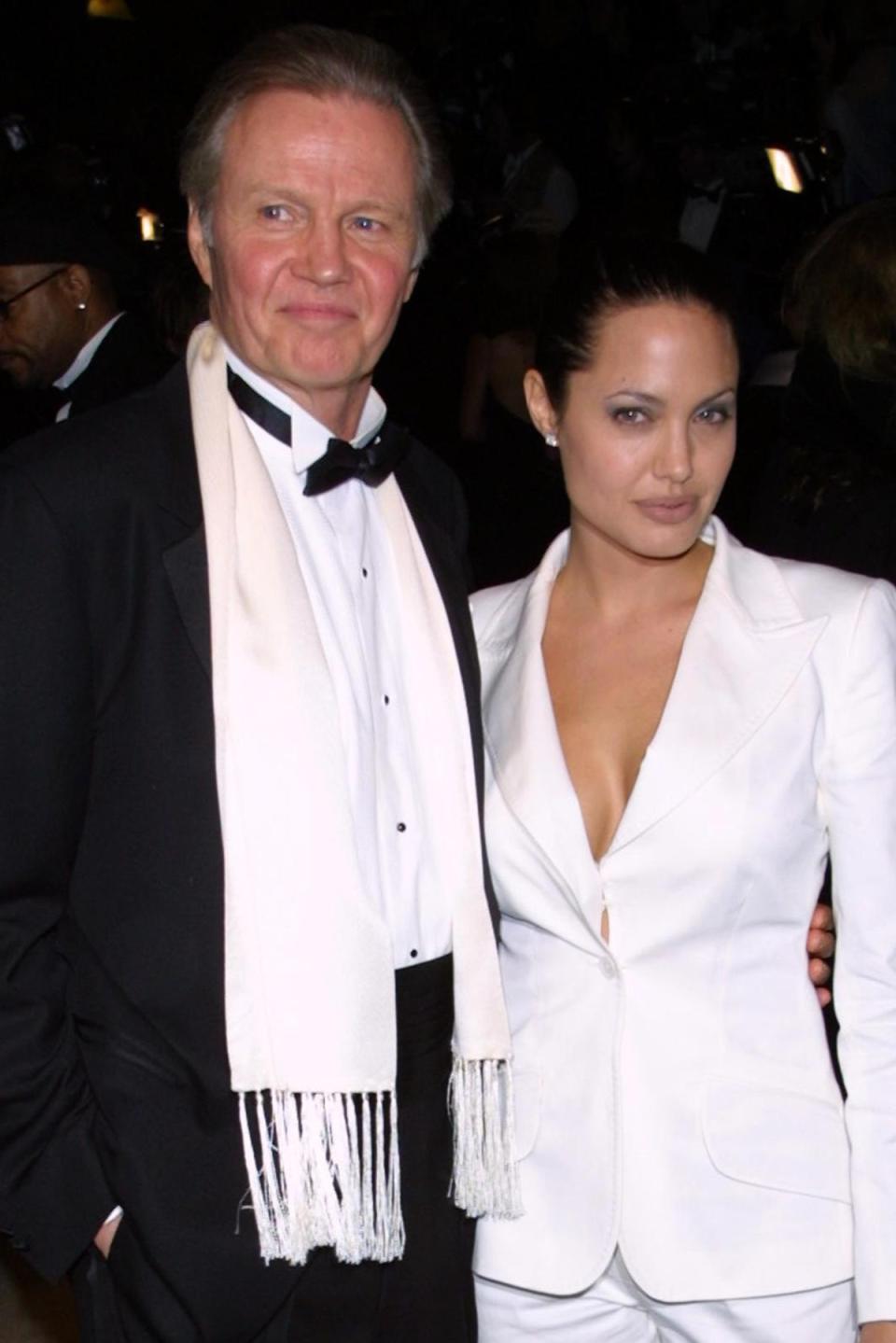Jon Voight’s surreal journey from countercultural hero to A-list Trumpster

- Oops!Something went wrong.Please try again later.
- Oops!Something went wrong.Please try again later.
- Oops!Something went wrong.Please try again later.
- Oops!Something went wrong.Please try again later.
Finally! Jon Voight has spoken out about Israel and Palestine. Sitting in front of an American flag, the Oscar-winning actor seems to be reading off an autocue. His stances are all fire and brimstone, finger-wagging, and operatic declarations that “the Messiah will win this war” between Israel and Hamas. It’s undeniably dramatic. He is also not a fan of the recent actions of Angelina Jolie, his Oscar-winning daughter and an advocate for an Israeli ceasefire. She, Voight insists, has “no understanding of God’s honour, God’s truth”.
Voight’s political transformation, and his use of social media as a tool to spread his personal gospel, won’t come as a surprise to anyone familiar with the celebrity darlings of the American right-wing – the 84-year-old has been bloviating conservative, God-fearing talking points for years now. But it is a surprise when you consider the work that made him famous. Voight played a gay hustler in John Schlesinger’s seminal Midnight Cowboy (1969) and starred in a string of anti-war dramas including Catch-22 (1970) and The Revolutionary (1970). In 1979’s Coming Home, for which he won the Best Actor Oscar, he didn’t just play a war veteran crippled in Vietnam, but someone married to a character played by Jane Fonda – Hollywood’s most famous leftist and the American right’s long-time boogeyman.
On paper, at least, it’s a jarring juxtaposition. When Dean Cain or Kevin Sorbo came out as Republicans, it was no big deal, nor particularly shocking. Nineties musclemen famous for playing Superman and Hercules, respectively, who also haven’t been heard from in at least two decades? Sure! Go for it, lads, those God’s Not Dead movies won’t make themselves. But Voight was a counterculture icon at one point, his face synonymous with tales of rebellion, revolution, sexual fluidity and the dismantling of the status quo. What happened?
According to Voight himself, his earlier political leanings were a terrible, terrible mistake – and the fault of those dastardly, brainwashing socialists. “I was caught up in the hysteria during the Vietnam era,” he wrote in 2008, in an op-ed for The Washington Times, “[it was] brought about through Marxist propaganda underlying the so-called peace movement.” He added that America’s Democratic Party deliberately targets young people, “knowing how easy it is to bring forth whatever is needed to program their minds”.
In recent years, Voight has backed a number of Republican politicians, notably Donald Trump. In 2016, he defended Trump’s infamous “grab them by the pussy” rant by claiming that he doesn’t know “too many men who haven’t expressed some sort of similar sexual terms towards women”. He also condemned “foul” actor Robert De Niro for saying he’d like to “punch” Trump in the face; “Voight is a nice guy, but he’s delusional,” De Niro said in response. In 2017, Voight said that he did not know “if God could reverse all the negative lies against Mr Trump, whose only desire was to make America great again”. In 2019, he called Trump America’s “greatest president since Abraham Lincoln”. When Trump lost the presidential election to Joe Biden in 2021, Voight backed his incorrect claims that his presidency was fraudulently stolen from him, and said that the situation was a “battle of righteousness versus Satan”.
In light of all of that, Voight’s early interviews make for sobering reads. “I am a feminist,” he told Rolling Stone in 1979. “I’m aware of the feminine aspects of myself. I’m encouraging them … and I respect it in other men, because to me it makes other men more trustworthy, because they are more aware of themselves, and they’re stronger because they bend. They’re less brittle.”
In the same interview, he also rejected a very American kind of blood-thirst, citing it as the main reason he chose to make 1972’s Deliverance, about a group of businessmen who encounter a barrage of ghoulish violence on a rural canoe trip. “I made Deliverance with Vietnam in mind,” he explained. “I made it because I wanted to show people what it was to have to face killing somebody. Because everybody around here’s going to movies where they shoot people off horses and get shot in subways. The experience of a human being, what he has to go through when he kills somebody – that’s what it’s about. Things don’t have to be about politics to be political.”

It remains an accurate statement, and particularly when it comes to Voight’s movie career. The actor’s greatest films – even late-period ones such as Michael Mann’s crime epic Heat (1995) or the kiddie favourite Holes (2003) – are awash in political subtext, resisting heavy-handed moralising in favour of shining a spotlight on those typically forgotten by the mainstream. War veterans, certainly, but also ex-prisoners, sex workers, children in poverty and sociopolitical systems often overwhelmed by corruption. It’s unfortunate that Voight seems to have overlooked all of that.
What also makes Voight’s political turnaround so fascinating, besides the substance of his past work, is that his daughter has long been active as a humanitarian and activist. Angelina Jolie has never aligned herself with any particular political party, but has spent more than two decades working alongside the United Nations and acting on behalf of people displaced by war and persecution. Her call for a ceasefire in Gaza – in order to allow vital aid into the region – was inevitable. Voight’s public censure of his own child, sadly, was even more so.

The pair had a tumultuous relationship even before their political differences became apparent. They were estranged for much of Jolie’s adolescence, after Voight and Jolie’s mother Marcheline Bertrand separated shortly after her birth. “I had an affair and there was a divorce,” Voight has said. “There was a lot of hurt and anger.” He arguably worsened things by talking about Jolie in the press once she became a star. After Jolie fought addiction in the Nineties, Voight said he was to blame for her “serious mental problems”, adding that “she was never normal”. In 2007, he claimed that his estrangement from Jolie – and his son, James, who later accompanied Voight to the White House when he collected a Medal of Arts honour from Trump – stemmed from “their inability to let go of years of programmed anger from their mother, who understandably felt quite hurt when we divorced”.
The pair seemed to reconcile once Jolie started a family of her own. Voight spoke proudly of meeting his grandchildren in 2010, and supported Jolie as she underwent a double mastectomy as a preventive measure against an 87 per cent chance of developing breast cancer. Where they stand now, though, is unclear – particularly after Voight’s criticism of his daughter this week.
Their dynamic, though, is echoed all over the world today. Many of us have learnt to overlook newfound political stances held by our loved ones that don’t align with our own. Or struggled through difficult conversations at the dinner table. I know from experience that it’s sometimes easier to let an elderly relative bleat on inelegantly about “benefits culture” or immigration than it is to try and challenge them. Then again, I also don’t have to worry that they’ll spread their views – and their disappointment in me for thinking differently to them – to their 818,000 followers on Twitter/X.
To his credit, Voight has never expressed regret for starring in any of his more leftist films. But it’s also fundamentally upsetting to see a true Hollywood great – regardless of their political opinions – become a run-of-the-mill social media proselytiser in their old age; someone once so handsome and enigmatic now clumsily, depressingly mortal.

